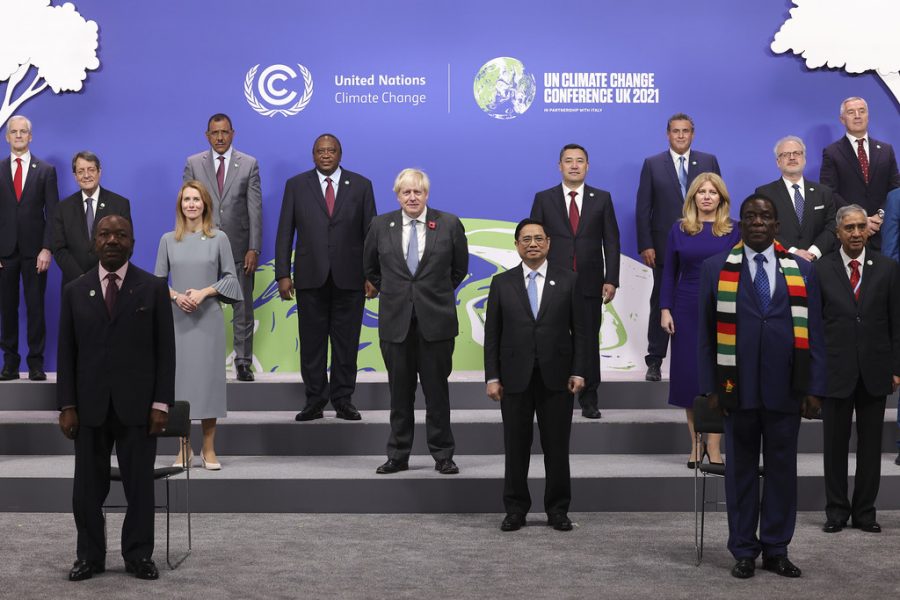COP26’s Glasgow Climate Pact leaves climate experts and activists disappointed
December 11, 2021
After days of negotiations and shouts of urgency, the COP26 climate summit concluded on Nov. 13 with the Glasgow Climate Pact, an agreement many activists and environment experts say lacks execution and accountability despite the breakthrough discussions on fossil fuel and deforestation
Representatives and leaders from more than 100 nations who gathered in Glasgow, Scotland, discussed potential changes in the use of fossil fuels, and for the first time, efforts to reduce coal use were directly addressed in the pact.
To stay within the desired target of 1.5 Celsius of global heating, at least 40% of the world’s existing 8,500 coal-fired plants must be shut down by 2030 and no new plants should be built, according to The Guardian.
The original agreement, however, included a stronger commitment to the reduction of coal use, but this was amended after some countries agreed to sign the pact only if the phasing “out” of coal was changed to phasing “down,” according to CNN.
Another pledge in the pact calls for wealthy nations to allocate more funding toward helping developing nations stave off the effects of climate change.
This followed passionate speeches from leaders of the developing nations on the front lines of the climate crisis as they criticized many wealthy countries for falling short on their first pledge to provide $100 billion by 2020, according to Vox.
The pact also included loss and damage provisions for these developing nations, which refers to irreversible effects of climate change that can no longer be adapted to, like hurricanes and island territory losses due to rising sea levels.
Leaders of developing countries stressed that the payments should not be considered charity but rather compensation. Wealthy nations have tried to skirt around these claims, as it would make them vulnerable to endless legal liability, according to The Guardian.
The wealthiest countries who are also chronic carbon emitters have caused vulnerable countries like Haiti, Myanmar, Mozambique, Zimbabwe and the Bahamas to suffer the most while contributing virtually nothing to the climate crisis, according to Vox.
Scotland pledged $2.7 million outright to help vulnerable countries with climate-related losses and damages. While this is a relatively small sum, experts have called it a good start to encourage other countries to follow, according to Wired.
“My message to donor countries is very, very clear: Without adequate finance, the task ahead is nigh impossible,” said Alok Sharma, president of COP26, according to Vox.
While leaders pledged to stop deforestation by 2030, they didn’t provide a clear guide for how it would be policed.
A strategy to cut 30% of methane emissions by 2030 was concurred on by more than 100 countries. China, Russia and India, some of the world’s largest carbon emitters, have yet to join but there is hope they will later, according to BBC.
The United States and China pledged to cooperate on methane emissions and the switch to clean energy.
India announced at the summit that it plans to reach net-zero emissions by 2070, but it has not laid out the exact details of how it plans to do so. This follows the pledge of the U.S. to go netzero by 2050 and China by 2060, according to Wired. While these promises seem great, their execution was not thoroughly discussed or expanded on.
Discussions at COP26 also included countries returning to COP27 with better pledges. Some major emitters like Australia and the United States, however, claimed that they were exempt, according to Wired.
A huge issue climate activists and experts are pointing out is that these provisions are unrealistic, as only a few countries made these promises legally binding, while others mostly rely on self-policing to execute them.
“We all need to persuade our political leaders to join us in the great transformation,” Professor Tim Lenton of Exeter’s Global Systems Institute told BBC. “The international policy process is moving slower than the climate system.”
While leaders and representatives return to their home countries to communicate the executions of these plans, the question of the effectiveness of the COP26 Glasgow conference remains to be answered by COP27 in Egypt next year.







